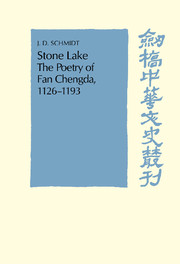Book contents
- Frontmatter
- Contents
- Preface
- Acknowledgments
- I Biography and critical study
- 1 The life of Fan Chengda
- 2 The formative period
- 3 Jiangxi wit and Fan Chengda
- 4 Buddhism and the dharma of sleep
- 5 The mountains and rivers
- 6 The fields and gardens
- 7 The poetry of patriotism
- II Translations
- Notes
- Bibliography
- Index
3 - Jiangxi wit and Fan Chengda
Published online by Cambridge University Press: 29 March 2010
- Frontmatter
- Contents
- Preface
- Acknowledgments
- I Biography and critical study
- 1 The life of Fan Chengda
- 2 The formative period
- 3 Jiangxi wit and Fan Chengda
- 4 Buddhism and the dharma of sleep
- 5 The mountains and rivers
- 6 The fields and gardens
- 7 The poetry of patriotism
- II Translations
- Notes
- Bibliography
- Index
Summary
Wit
Earlier we suggested that Huang Tingjian's extensive use of allusion in his poem on the orangutan fur writing-brush was much less important for the formation of Fan Chengda's mature style than the general approach to writing that underlies Huang's allusions. Critics have properly paid much attention to allusion in Jiangxi-style poetry, but they have overlooked something that would seem to be even more fundamental to the creations of Huang Tingjian and his followers, namely, the central position of wit in their writing. Of course, various critics have mentioned the importance of humor in Song poetry, and Yoshikawa has stressed the intellectual qualities of Song verse, but no one seems to have explored the connections between Song humor and intellectuality to elucidate the central importance of wit in the work of many of the major poets. Although it does not lie within our scope to recapitulate the history of Song dynasty verse, it would seem that a neglect of the wit of Song poetry has tended to obscure some of the important unities that underlie more than two centuries of Song literature.
Most Chinese critics draw a clear line between the work of Su Shi and Huang Tingjian, and yet if we examine Su's poetry more carefully, we discover that he shares many traits with Huang. Su was not just witty in the sense that he had a good sense of humor (Yoshikawa also speaks of his “transcendence of sorrow”), for his diction and figures of speech display a striving for cleverness quite equal to Huang Tingjian.
- Type
- Chapter
- Information
- Stone LakeThe Poetry of Fan Chengda 1126–1193, pp. 41 - 60Publisher: Cambridge University PressPrint publication year: 1992



